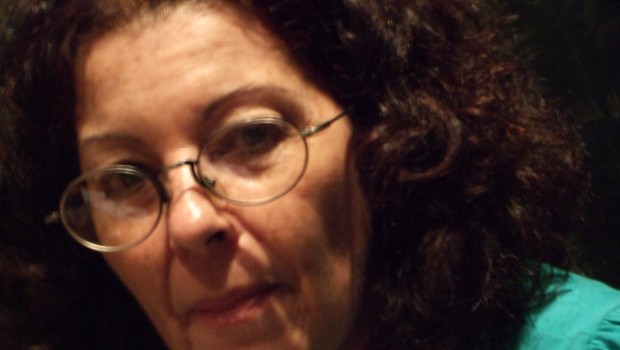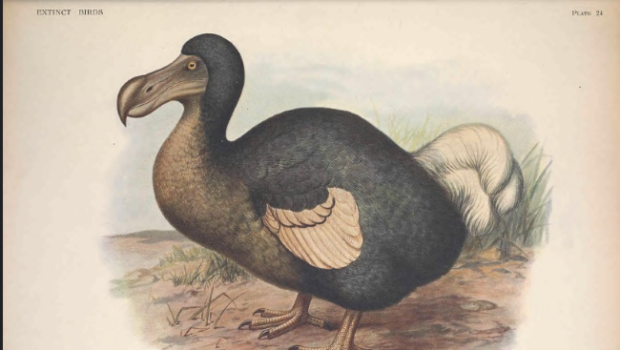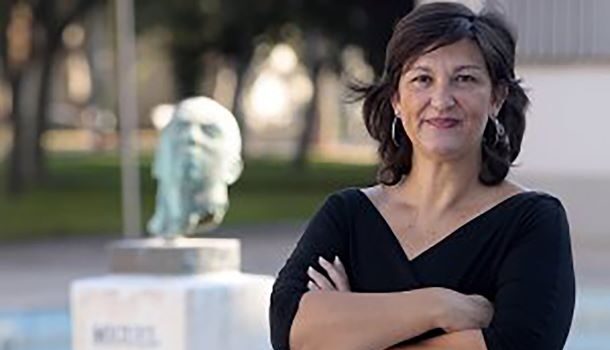Sex, Sexuality, Eroticism
Sexo, sexualidad, erotismo
Anacristina Rossi
Translated by Carol Polsgrove and Paloma Fernández Sánchez
(from El lado oscuro: ensayos sobre violencia)
From the editorial meeting emerged the topic: writing an essay on sex. I took up the gauntlet, accepted the challenge.
I sit down, then, to write an essay on sex. But it does not come out. It does not come out because though it is indeed obvious what topic was entrusted to me or I chose or accepted, sex is not the right word. Sexo is an Anglicism that has slid so surreptitiously among us that we still do not notice the contradiction in terms. A gringo can ask, “Do you have sex?”—referring not to whether the person addressed is a man or a woman but whether or not he or she has sexual activity. In Spanish to find out if someone has sexual activity by asking, “Tienes sexo?” is a contradiction in terms; the question would refer to whether the person is or is not a gendered being —whether or not he or she has a sexual identity. A better word for the topic that we are considering here would perhaps be sexuality (sexualidad).
Nevertheless the slippage occurs and nowadays it’s said of a movie that “it has a lot of sex and humor” or that such and such book has “sex and violence” or that so and so is obsessed with sex, or that sex permeates commercial advertisements. In short, there is in our present-day Spanish a semantic field associated with the word sex understood as sexual activity. And the word sexuality does not necessarily encompass that semantic field. It is possible to have sexuality without having sexual activity.
Nevertheless I decide to use sexuality and define things as I go along. Thus I again take up paper and pen to write this essay on sexuality. But it still doesn’t come out. Because I cannot begin there. All around sexuality there is a sphere of influence that is called eroticism (erotismo) and in order to be able to reach sexuality it is necessary to navigate, cross, or get lost in this sphere of influence. Only thus can we arrive at sexuality. Then if indeed the topic would go on being the same, the specific words to consider in this essay would be sexuality, eroticism.
I let these images tumble around, ferment, and after a while I again sit down to write. But I still can’t. Nothing comes out. There is something else blocking the way. Something that happened recently and I just heard about.
The story is this: A fifteen-year-old girl from an humble peasant home is at a fair in a remote rural zone. She drinks a beer. She goes to the bathroom. Some young guys have seen her. They follow her. They also go into the bathroom. Taking advantage of the hullabaloo of the party, the deafening ruckus of the music, eight boys violate her, one by one, several times. They put broomsticks and beer bottles into her vagina and anus. When they finish their work, they disappear.
The people at the party find the girl on the floor in the bathroom bleeding to death. They take her to the hospital. The walls of her anus, vagina, womb, are shattered into pieces. The doctors succeed in stopping the hemorrhage. But she has been physically destroyed inside. When they told me this story they said: They had to take it all out. They mended what was left so that she could go on living.
But the 15-year-old girl in that remote corner of Costa Rica does not want to go on living. She threatens suicide, they tell me.
Last night in my house, I received the call: the 15-year-old girl killed herself yesterday.
I cannot write about eroticism, sexuality, sex. I cannot. First I have to process the horror.
I had before me an agreeable task, an essay on sexuality. Life snatched away the task and returned it to me bloody, transformed into horror. To begin with, I had two words and a theme. Now I have four words: sexuality, eroticism, sex, horror. Will it continue to be a single theme? I don’t know. I only know that to talk about the former, I have to process the latter.
And how is the horror to be processed?
It is a crime, I tell myself in order to begin to put it into words. But I have doubts. Is it specified in the Penal Code? Does the Penal Code perhaps say, “When eight men take a minor, violate her one at a time, introduce sticks and bottles in her anus and vagina and tear up her insides and leave her bleeding to death, they commit a crime greater than any, which is called “horror,” which will be punished with….” No. The penal code does not say that. What does it say?
Then I remember a similar case, at the other end of the social spectrum. A child of a wealthy and influential family, a little older than the fifteen-year-old, is at a party and goes out to the bathroom. Four guys she knows, also members of a wealthy family, approach her. In a neighboring field they violate her one at a time and also destroy her insides. When people told me, they spoke of the family’s despair. And they told me one thing, a detail—I don’t know how true it is now is or if it was a passing thing, but it deeply impressed me: the family did not want to go out of their house.
I imagine the parents of the violated girl looking at the parents of the violators. Will they want to confront them? And if they do, with what legal weapons? How is one accused of a crime that is much worse than a homicide and is usually committed against a woman?
In order to try to escape the horror, at least in writing, I imagine what the mothers feel, the mother of the fifteen-year-old and the other, and I merge them into one. In the hospital, the mother gazes at the shattered genitals of her child, those tender organs that the child never had time to use. And the anger and despair are so great that they drown her. She feels, she knows, she senses that there are no words to describe what they have done to her daughter. She feels, she knows that there is no redress for this event, either in heaven or on earth. Nor even in hell.
The mother feels that the only way to able to go on living is to make of the four, the eight, perpetual prisoners. To eliminate them from society. They are not worthy of remaining in this world. She would like to see them dead, would like to kill them, but even at the height of her despair, she is not a killer, she settles for their imprisonment without possible appeal, with none of the four, none of the eight, ever having a normal life. Because, from now on, her daughter would never have a normal life.
The 15-year-old country girl knows this too. But in addition she knows that in her case the criminals will never be caught and never properly punished. And that if she goes on living, she could someday, any day, fall into their hands again.
The 15-year-old kills herself and in that act comes closer to the mother who does not wish to leave her house or cannot because she knows that she cannot live with what has happened. She knows that in this country, Costa Rica, the horror is not punished. It is scarcely described or defined. The fifteen-year-old who kills herself and the mother who does not want to leave her house have in common the knowledge that death is a sweet consolation. The only consolation.
I write and my eyes fill with tears. Those new, tender, but destroyed genitals are in essence the same ones that would have to serve me in talking about eroticism, about sensuality, about something delicious. But it turns out to be impossible. I can’t do it. And I realize that it is impossible and that I can’t do it, not because something is happening to me or because I have a personal problem or because the story of these two violations has affected me but because it is objectively impossible. Eroticism and sexuality have nothing to do with genital organs. I hate genitality. Masculine genitality and unfortunately general usage reduce sexuality to sex: to the penis and the vagina.
Do I hate it? Whose expression is it?
This is another story. It was told to me, too. She told it to me. She’s very close to me. Her story, too. Because we are close friends or because we are women or because we are of the same generation.
She told me:
“Two months ago he called me. We went more than thirty years without seeing each other, without talking. He told me he wanted to see me. Just for a moment. Only to tell me something, only to talk. He gave me the address of his office. He asked me to come by. I hung up the telephone and cried. But I did not go. Again he called me. He begged me. It’s only a little while, he said. And only once.
Only once.
I go to his office. He is waiting for me in the doorway. In the doorway he simply embraces me the way two old friends embrace, an embrace into which slips deep affection from the past. An affection like a current that has no words and that connects us like a subterranean river. He looks at me. He admires me. I cannot be mistaken. His smile is a smile of…What? He is happily married and in love with his wife, and I am in love with my companion whom I love more than anything in the world. But I have a past. Everyone has one. Thus we look at each other. Thus his smile. My tears slip out.
We go to his office. He leaves the door open. The messenger has to come in and out, the secretary too. And nevertheless an unbreachable zone of intimacy is established between him and me. Circumscribed, limited, yes, but at the same time immense. It is the intimacy of thirty years ago. I do not know if I am telling you this badly, I do not know if you understand me.”
I say that yes, that I understand her, that she can go on.
“He sat at his desk, I in the chair in front of him. He was nervous. He did know how to begin. Finally he told me. That he loved me greatly. That he is going to love me always. That I ought to know it.
I feel exactly the same.
No, don’t misinterpret me, Ana, let us understand each other. I do not now love that fifty-year-old though still good-looking man, and he, for his part, does not love this woman that I am. What he has said to me with his phrase and his smile and his eyes of clear honey is that within him goes on existing a young man of twenty that loved, briefly but intensely, a young woman of nineteen who I was and who also goes on existing within me. I turn my face away because I am on the verge of crying and I answer him the only way I can answer him, You opened me to eroticism. And he says to me, And you, me. What I felt with you and for you was and goes on being the most intense feeling, for me still without equal. And I say to him that the same happens to me. I tell him, It was a madness, thanks to you I knew I could feel that madness. And he says to me, No, it was not thanks to me, it was thanks to you, you had that madness, you gave it to me, you knew much more. And I tell him no, I knew nothing before meeting you. Me neither, he tells me, how was I going to know if you taught me? But no, I could not teach you because I did not know. I learned it with you. In any case it was incredible, he says, marvelous. I tell him, Yes.
And it is true. The years pass and the memory of those afternoons remain. Afternoons of strolling, of talking. And among them, two special afternoons. Only two. We have never talked of that, I say. No, we never speak of it, I tell him, and the intensity of what happened thirty and so many years ago returns to place itself between us. Right in the middle.
Because it has not been lost. It has not gone away. It is not going away. It is, after all, the substrate on which we erect or unfurl the rest of our lives, it is the foundation on which we have been able to build intimacy and lasting love with other people. Then I break any inhibition that I had brought with me and I tell him, I am going to use two strong words [1]— it was climactic, it was intimate, it was the most intimate, most climactic experience of my life, I have had experiences just as powerful and of course longer and more satisfying, but never more climactic than that one with you. And he tells me that it is exactly the same for him. And I tell him, smiling, And we never made love. And he says to me, No, unfortunately. And I think, please don’t ruin it, I think it and I don’t say it, I remain silent. And then he says, It is very strange, true, it is extraordinary and we carry its imprint but never did we get around to making love. And I shrug my shoulders and think that thirty years have passed and it appears that he still has not understood. I am thinking that probably what he gave me, he gave me by chance, by a fluke, if we had stayed together he would have ruined it. But I don’t tell him that, you see, I start to remember. The way in which one remembers hours, days, weeks, in only seconds. The intensity of time. Ana, time has a dimension of intensity that scientists don’t take into account. Because in a few minutes I go back thirty years and relive days, hours, weeks.
He was so handsome. I liked his eyes. I liked his body, tall but not too tall, delicate and muscular. But above all I liked his intelligence. I met him because we took the same history class. He knew that I liked him. And that I attracted him. And that the attraction that he felt was moving through the same channels. We became friends. “I like the way you think,” he used to tell me, “and what I like most is your inner logic.” There were afternoons of inner and outer logic, of discussing Marxism, of wanting to change the world, of mutually exercising our intelligence, eyeing each other through a physical attraction that made us touch each other and smile when there was nothing to smile about.
And then it occurred. An afternoon when I came from the gym and had bathed and put on loose clothes to go around the house with damp hair, barefoot, I was enjoying my privacy, and he decided to stop by and visit me that day. Never had he touched me and that afternoon it occurred to him to slide his fingers along my neckline and he found no resistance, there were no undergarments. Without thinking about it, his hands covered my breasts with caresses as fine as silk, as gentle and devastating as the love that we now had for each other but were ignorant of. His hands entering through the neckline unleashed in me a chemical and spiritual transformation. I am remembering that, and I want to say it, now that he is seated behind his desk, silent. But I cannot. I can only remember. Remember that my body responded to his fingers, to his hands, in a way so complete that I was frightened. I could not move anymore. Parts of my body that were not being caressed responded as if they were, as if they had received thousands of caresses. A wave rolled through me from head to toe. All my tissues suffered—or took pleasure from—a kind of swelling. I was really frightened. What was happening? My body was offering itself without consulting me? I closed my eyes. “What’s going on?” he said to me in that moment thirty years ago. But I was caught up in a whirlwind and could not speak. I could only feel. And the tiny part of me that still kept control could not speak, either, because it was frightened. I did not know where I was going. Where it was going to end up. I felt it inside, like bells ringing. Then the tiny part of me that still had control took his hands and drew them away from my neckline, and in a voice hoarse and almost inaudible asked that he leave. And he, respectful, amorous, gave me a kiss on my cheek and went.
The next week when we saw each other, we did not speak of what had happened because we were too young, we did not know what it was, and we were not accustomed to speaking of such things. We had suddenly taken hold of a great intimacy without knowing it, and we could not name it.
Then there was the other afternoon. And it was the last one. It began with a kiss at the end of summer in a wooded pasture. He kissed me and began to tremble. I remember that in that moment I thought I loved him. I remember feeling his legs against mine, the excitement of feeling his strong thighs that I touched and they went out of control like runaway horses. He was kissing me and he was beside himself. His whole body trembling, he laid me down under a mango tree. It was like falling, drowning in delight. It was hard to breath. He did not undress me. He did nothing more than put his trembling hand on my waist and touched me farther down. Just a little. And that light, delicate caress had a very strange effect. It turned me into a fistful of feathers. A force and a delicious tingle hurled me beyond the world. I flew or I drowned. It was like losing consciousness. I was a species of gentle boa that floated below or above everything. It was my first orgasm, Ana, but I could not know it. My body tried to arc, turn, pant, or cry out.
I did not get to cry out. Frightened by his own uncontrollable trembling and what was happening to me, he grasped me by the arms and lifted me and he almost cried out, “No! We must not! Not this!” I hold the vivid image of his face, frightened. I did not know what had happened to us. How to know?
It took me a long time to come down or rise up from eternity. To return to my channel. To collect all the water that had poured out, all the rainwater that had overflowed, and return the tissues to their usual size.
The frenzy was calming in silence, and then, quiet, we walked toward the road. Still he was trembling a little. I was still sighing.
We caught the bus.
We never talked about it. My body could not adjust to the shock. It was frightened, it shrank into itself, it protected itself. And we were so young and so inexperienced that instead of talking about and healing the wounds, we stopped seeing each other. He insisted a little on going out again but not too much. I always rejected the invitation. I never said anything to him, neither good nor bad. And then in that moment, seeing him there at his desk, thirty years later, I tell him, that afternoon when you lifted me from the ground I turned frigid. The sentence is like a bullet. It hits him. He flinches . He tells me, Yes, I know that I damaged you, now what I want is to ask your forgiveness.
I shrug my shoulders. I do not know if you damaged me, I tell him. And it is true, I don’t know it, because in time the frigidity passed and later on I began to look for and could find the sexual —or sensual?—ecstasy and delight that he had stirred in me. That we had stirred in each other. Without taking our clothes off. Without penetration.
He lifts his head and insists, I damaged you. Yes and no, I answer, the frigidity passed and I recovered the delight and it remained with me for all my life. I learned it. And he tells me, I also learned, but you, what did you learn?
The afternoon wanes and sunlight falls through the office window and into his eyes and makes them clearer. I learned something very important, I tell him, something transcendent. He laughs at my words, jokes, says, How intense we are. I’m not joking, I tell him, I learned that the best thing about sexuality, the best thing about eroticism, does not have much to do with sexual organs. It does not have much to do with penetration. I discovered this that afternoon. He stares at me and tells me, But imagine how it would have been if we had done it. And then I dare to say it. I tell him something that, given the way this culture is, is maybe the worst thing a woman can say to a macho. Is he a macho? I don’t know, but I feel a little proud, a little outspoken. I think that someone has to begin to speak the truth. Our truth. I tell him, You are wrong, men are wrong. They believe that penetration is everything, and that’s not certain, at least for women it’s not certain. You say that we did not make love—alright, but for me we did; for you we didn’t because there was no penetration, genital contact, but I am sure that would have added nothing, maybe would have been equal in intensity to what happened, yes, equal, but never better. I don’t understand why you say that, he tells me. And I try to explain to him, I tell him, Look, I say it to you because what happened to us, at least what happened to me, was total. It involved every centimeter of my body and my soul. He watches me and nods, he agrees with that, he says, Yes, it was also total for me, so much so that it has pursued or accompanied me the rest of my life, he says. And I tell him, for me, too. And I tell him that if we had made love, as he says, it could not have been so total because he would have concentrated on penetration instead of spreading it through all my body as he did, as we did. We spread desire and maybe love throughout our body and soul, like crazy, overwhelmed people, but slowly, gently. And that is intimacy. It lasted only a little while but it was my first experience of intimacy. You gave me that. We gave it to each other.
He remains serious, silent. Without looking at me he murmurs that yes, in those two afternoons we learned a lot about intimacy and surrender.
When he looks at me, his eyes too are full of tears. He takes my hand. He holds it tight. He knows that we will not see each other again. I know it too. I don’t regret that we have not remained together, that we are not a couple. In some part of me I know without a shadow of a doubt that we could never have got along. I regret nothing and moreover it is important not to be confused, not to believe that we desire each other. Because we do not desire each other. What happens is that we have not betrayed that young man and that young woman of twenty and nineteen in that short period between January and April. You do not harbor resentment for me? he asks me. No, for nothing, I tell him. I get up to leave. But he still feels bad. He says, Understand me, you had more experience than I, you were not still a virgin.
It is true. I was not still a virgin, I had had sexual relations with another young man who I desired but in a different way. With that other young man my body did not feel. Yes, he deflowered me, penetrated me but it was as nothing. With him I had sex but no sexuality and even less eroticism.
Yes, I was a virgin, he says to me on saying goodbye, at the door.
And I say to myself, how strange! Our encounter definitively escaped the habitual parameters, and I think of other men I know, one that lost his virginity at nine years old, seduced by the housekeeper, another at five, seduced by the uncle. I think of the young men initiating each other in Latin America, Europe, China, and I ask myself, Will it be the same everywhere? And how is it for women?
We parted. And I left thinking that what had happened to us was like a jewel, something hard and precious but not as transparent as I had believed. Something hard and precious which was that, a knowing. For always. I am who I am thanks to what we experienced. And when memory hits me, I feel like crying. It’s logical, don’t you think?”
This is my friend’s story and I understand her perfectly, and so many of us will have experienced something similar. That knowledge came to her through that man. That knowledge has reached some, without being bisexual or homosexual and others being so, through another woman.
And here, now, writing this blessed essay on sex, sexuality, eroticism, I realize what it is. The horror stories of violated girls and the story of my friend are telling me something in their juxtaposition. Something that has not yet let itself be revealed in what is already written but that I ought to round off, sum up. If such a complicated and vast matter lets itself be summed up.
I am going to try it.
I am going to say that for me and for a lot of women with whom I have shared many things through the years, eroticism and the most delicious aspects of sexuality do not have much to do with the penis or penetration. But I do not wish that I or we be misinterpreted. Penetration is fine, can be fine, always and when there is the other.
First, the other.
What is the other?
Eroticism and sexuality.
And what are they?
Let’s try to say something, to get close. Let’s say: they are like a current fed through the body, through the hormones, but also and above all through the brain, through intelligence, with amazement and fantasies, fantasies of things prohibited, fantasies of transgression, fed by smell, by clothes, by something that unleashed desire although it appears inoffensive, a broken fingernail, a sharp fang, and that current gathers force when it is nailed to the skin. “The deepest is the skin,” said a Mexican writer. Eroticism and its center, sexuality, are a current that runs through the skin very slowly, and are fed with amazement and fantasies and tenderness and languor. And in that journey encounters delicious border zones, like lips, hypersensitive zones, like thighs, breasts. And so for this current to build and in truth roll on, it ought not to be stopped in the sexual organs. It scarcely grazes them, and keeps going, and on grazing them with the fingers and the mind passes through them, illumines them, makes them vibrate in the fullest concert of the body that becomes spirit.
Body is spirit and the dualism of body versus soul falls apart. And falls apart with a crash. In eroticism, in sexuality, body and spirit are one and the same thing.
What is sex, then, in its latent sense, in that sense that by sliding from an Anglicism comes to signify sexual relations or sexual activity?
Sex is the absence of loving words, the absence of tenderness, the absence of love. Sex is the absolute absence of intimacy. Sex is pure penetration. Sex is the penis. Sex is the vagina as silent and servile receptacle for being destroyed. Sex is sadism. Sex is machismo. Sex is violence against women. And daily life is full of sex, not of eroticism.
They turn to me, those two violated girls, those two destroyed girls, victims not of eroticism nor of sexuality but of sex, of the penis.
They remain within me as destroyed girls and still they will never leave as eroticism remained inside me for always, gentle and devastating and spontaneous, without forcing, without penetration.
And thus as those two girls are each one at an extreme of the social spectrum of horror, the criminal acts and worse than criminal that they suffered are of an order radically distinct from eroticism, from sexuality, from two persons, naked or not, very close, equal, talking and then breathing agitated or lost, in a bed, on a beach, in a corner of the street, in a field or under a mango tree.
[1] Esdrújula means, literally, a word with a stress on the antepenultimate syllable but it is also used to imply something with strong impact. The esdrújalas that Rossi uses here are álgido and íntimo.
En la reunión de la editorial surgió el tema: escribir un ensayo sobre sexo. Recogí el guante, acepté la propuesta.
Me siento pues a escribir un ensayo sobre sexo. Pero no sale. No sale porque si bien es obvio cuál fue el tema que se me encomendó o yo escogí o acepté, sexo no es la palabra correcta. Sexo es un anglicismo que se ha deslizado tan subrepticiamente entre nosotros que ya ni notamos el contrasentido. Un gringo puede preguntar: “Do you have sex?” refiriéndose no a si su interlocutor es hombre o mujer sino a si tiene o no actividad sexual. En español averiguar si se tiene actividad sexual preguntando “¿Tienes sexo?” es un contrasentido, la pregunta se estaría refiriendo a si la persona es o no un ser sexuado, si tiene un sexo o no. Una palabra más correcta para el tema que a quí nos occupa sería talvez sexualidad.
Sin embargo el deslizamiento existe y hoy en día se dice de una película que “tiene mucho sexo y humor”, o que tal o cual libro tiene “sexo y violencia”, o que tal o cual persona está obsesionada con el sexo, o que el sexo permea la propaganda commercial. En fin, que hay en nuestro castellano actual un campo semántico asociado a la palabra sexo entendida como actividad sexual. Y la palabra sexualidad no recubre necesariamente ese campo semántico. Se puede tener sexualidad sin tener actividad sexual.
Sin embargo, me decido a usar sexualidad y a ir definiendo las cosas sobre la marcha. Entonces vuelvo a tomar papel y pluma para escribir este ensayo sobre sexualidad. Pero tampoco me sale. Porque no puedo empezar por ahí. Alrededor de la sexualidad hay un área de influencia que se llama erotismo y para poder alcanzarla hay que navegar, atrevesar o perderse esa área de influencia. Sólo así se llega a la sexualidad. Entonces, si bien el tema seguiría siendo el mismo, las palabras concretas a tratar en este ensayo serían sexualidad, erotismo.
Dejo que las imágenes se revuelvan, fermenten, y pasado cierto tiempo me vuelvo a sentar a escribir. Pero tampoco puedo. No sale. Hay otra cosa bloqueando. Algo que sucedió recientemente y que me acaban de contar.
La historia es así: una muchacha de quince años proveniente de un hogar humilde, campesino, está en el baile de un turno en una remota zona rural. Se toma una cerveza. Va al baño. Unos muchachos la han visto, la siguen. Entran también al baño. Aprovechando el burumbún de la fiesta, el chacbumbúm ensordecedor de la música, ocho muchachos la violan, uno por uno, varias veces. Le meten palos de escoba y botellas de cerveza en la vagina y el ano. Cuando terminan su trabajo, desaparecen.
La gente de la fiesta encuentra a la niña tirada en el baño, desangrándose. La llevan al hospital. Las paredes del ano, la vagina, la matriz, están hechas pedazos. Los medicos logran detener la hemorragia. Pero ha sido físicamente destruida por dentro. Cuando me lo contaron me dijeron: Todo tuvieron que sacárselo. El resto lo remendaron para que pudiera seguir viviendo.
Pero la niña de quince años de ese remoto rincón rural de Costa Rica no quiere vivir. Amenaza con suicidarse, me dicen.
Anoche en mi casa se recibió la llamada: la niña de quince años se suicidó ayer.
No puedo escribir sobre erotismo, sexualidad, sexo, No puedo. Primero tengo que procesar el horror.
Tenía ante mi una tarea simpática, un ensayo sobre sexualidad. La vida me arrebató la tarea, la revolvió y me la devolvió sangrante, convertida en horror. Tenía para empezar dos palabras y un tema. Ahora tengo cuatro palabras: sexualidad, erotismo, sexo, horror. ¿Seguirá siendo un solo tema? No lo sé. Sólo sé que para hablar de las primeras tengo que procesar la última.
¿Y cómo se procesa el horror?
Es un crimen, me digo para empezar a ponerle palabras. Pero dudo. ¿Está tipificado en el Código Penal? ¿Dice acaso: “Cuando ocho hombres toman a una menor de edad, la violan en serie, le introducen palos y botellas en el ano y la vagina y la revientan por dentro y la dejan desangrándose, cometen el crimen más grave que existe, que se llama el horror, el cual será castigado con…” No. El Código penal no dice eso. ¿Qué dice?
Entonces recuerdo un caso parecido, en el otro extremo del espectro social. Una niña de familia pudiente, un poco mayor que la quinceañera, está en una fiesta y sale a orinar. Se le acercan cuatro muchachos conocidos, también de familia pudiente. En un potrero vecino la violan en serie y también le destrozan su adentro. Cuando me lo contaron me hablaron de la desesperación en que estaba la familia. Y me dijeron una cosa, un detalle, que no sé cuán real es ni si fue pasajero, pero me impresionó: que los padres no querían salir de la casa.
Imagino a los padres de la niña violada mirando a los padres de los violadores. ¿Querrán enfrentarlos? Y si lo hacen, ¿con qué armas legales? ¿Cómo se acusa de un crimen que es mucho peor que un homicidio y que generalmente se comete contra una mujer?
Para intentar una salida al horror, al menos en la escritura, me imagino lo que sienten las madres, la de la quinceañera y la otra, y las fundo en una. La madre mira en el hospital los genitales despedazados de su hija, esos órganos tiernitos que la niña no tuvo tiempo de usar. Y la ira y la desesperación que la invaden son tan grandes que la ahogan. Siente, sabe, intuye, que no hay palabra para describir lo que le han hecho a su hija. Siente, sabe que no hay reparación para lo sucedido, ni en el cielo ni en la tierra. Ni siquiera en el infierno.
La madre siente que el único modo de poder seguir viviendo es hacer de los cuatro, de los ocho, unos presos perpetuos. Eliminarlos de la sociedad. No son dignos de seguir en este mundo. Quisiera verlos muertos, quisiera matarlos, pero como aún en el colmo de su desesperación no es una asesina, se conforma con que los encierren sin apelación posible y que ninguno de los cuatro, ninguno de los ocho, pueda llegar a tener una vida normal. Porque su hija tampoco podrá jamás tener de ahora en adelante una vida normal.
La quinceañera rural lo sabe también. Pero además sabe que en su caso los criminales nunca serán encontrados y nunca serán castigados en forma debida. Y que si ella continúa viviendo podrá caer algún día, cualquier día de estos, de nuevo en sus manos.
La quinceañera se suicida y en ese acto se acerca a la madre que no quiere o no puede salir de su casa porque sabe que con lo que ha pasado no se puede vivir. Sabe que en este país, Costa Rica, no se castiga el horror. Ni siquiera se describe ni se tipifica. La quinceañera que se suicida y la madre que no quiere salir de su casa tienen en común saber que la muerte es un consuelo dulce. El único consuelo.
Lo escribo y los ojos se me llenan de lágrimas. Esos genitales nuevos y tiernitos pero destrozados son en esencia los mismos que tendrían que servirme para hablar de erotismo, de sexualidad, de algo delicioso. Pero resulta imposible. No puedo hacerlo. Y me doy cuenta de que es imposible y que no puedo hacerlo no porque a mí me pase algo, no porque yo tenga un problema subjetivo o porque el relato de las dos violaciones me haya afectado, sino porque es objetivamente imposible. El erotismo y la sexualidad no tienen nada que ver con los órganos genitales. Odio la genitalidad. La genitalidad musculina y por desgracia general que reduce la sexualidad al sexo: al pene y a la vagina.
¿La odio? ¿De quién es la frase?
Esta es otra historia. También me la contaron. Me la contó ella. Ella está muy cerca de mí. Su historia también. ¿Porque somos muy amigas o porque somos mujeres o de la misma época?
Ella me contó.
“Hace dos meses me llamó. Teníamos más de treinta años sin vernos, sin hablarnos. Me dijo que quería verme. Un momentito. Sólo decirme algo, sólo hablar. Me dio la dirección de su oficina. Me rogó que pasara. Colgué el teléfono y lloré. Pero no fui. Volvió a llamarme. Me rogó, es nada más un ratito, me dijo. Una sola única vez.
Una sola única vez.
Voy a su oficina. Me está esperando en la puerta. En la puerta simplemente me abraza como pueden abrazarse dos viejos amigos, un abrazo en que se cuela un afecto hondo, de antes. Un afecto como una corriente que no tiene palabras y que nos conecta con un río subterráneo. Me mira. Me admira. No puedo equivocarme. Su sonrisa es una sonrisa de… ¿qué? Él está felizmente casado y enamorado de su mujer, y yo estoy enamorada de mi compañero y lo quiero más que a nada en el mundo. Pero tengo un pasado. Todo el mundo lo tiene. Por eso nos miramos. Por eso su sonrisa. Se me salen las lágrimas.
Pasamos a su oficina. Deja abierta la puerta. El mensajero tiene que estar entrando, la secretaria también. Y sin embargo entre él y yo se establece un área de intimidad irrompible. Circunscrita, limitada, sí, pero a la vez inmensa. Es la de hace treinta años. No sé si te estoy contando esto muy mal, no sé si me entendés.”
Le digo que sí, que la entiendo, que siga.
“Él se sentó en su escritorio. Yo en la silla de enfrente. Estaba nervioso. No sabía como empezar. Por fin me lo dijo. Que me quiso mucho. Que me va a querer siempre. Que yo debo saberlo.
Yo siento exactamente lo mismo.
No, no me malinterpretés, Ana, entendámonos. Yo no quiero ahora a ese hombre aún apuesto de cincuenta y tantos años y él no ama a esta mujer ídem que soy. Lo que me ha dicho con su frase y con su sonrisa y con sus ojos de miel clara es que adentro de él sigue existiendo un muchacho de veinte que quiso, en forma breve pero intensa, a la muchacha de diecinueve que fui y que también sigue existiendo adentro mío. Vuelvo la cara porque mis ojos están húmedos y le contesto lo único que puedo contestarle, Vos me abriste al erotismo. Y él me dice Vos a mí. Lo que sentí con vos y por vos fue lo más intenso y sigue siendo para mí algo sin igual. Y yo le digo que a mí me pasa lo mismo. Le digo, Fue una locura, gracias a vos yo supe que se podía sentir esa locura. Y él me dice, No, no fue gracias a mí, fue gracias a vos, vos tenías esa locura, vos me la diste, sabías mucho más. Y yo le digo que no, Yo no sabía nada antes de conocerte. Y yo tampoco, me dice él, cómo iba a saber, si vos me enseñaste. Pero no, yo no podía enseñarte porque yo no sabía. Lo supe con vos. En todo caso fue algo increíble, me dice, maravilloso. Yo le digo que sí.
Y es verdad. Pasan los años y el recuerdo de esas tardes queda. Tardes de paseo, de hablar. Y entre esas, dos tardes especiales. Solamente dos. Nunca hemos hablado de eso, le digo. No, nunca lo hablamos, me dice él, y la intensidad de lo ocurrido hace treinta y tantos años se vuelve a instalar entre nosotros. En el puro medio.
Porque no se ha perdido. No se ha ido. No se va. Es el sustrato sobre el cual levantamos o desplegamos después todo el resto de la vida, es el cimiento sobre el cual hemos podido construir intimidad y amor duraderos con otras personas. Entonces rompo cualquier inhibición que llevara y le digo, Voy a usar dos esdrújulas, fue álgido, fue íntimo, fue lo más íntimo y lo más álgido que hubo en mi vida, he tenido cosas igual de fuertes y por supuesto más largas y satisfactorias, pero nunca más álgidas que aquello con vos. Y él me dice que para él es exactamente lo mismo. Y yo le digo, sonriendo, Y nunca hicimos el amor. Y él me dice, No, lástima. Y yo pienso, por favor no lo arruinés, lo pienso y no lo digo, me quedo callada. Entonces él dice, Es muy raro, verdad, es lo más fuerte y quedamos marcados pero nunca logramos hacer el amor. Y yo me alzo de hombros y pienso que han pasado treinta años y parece que él aún no ha entendido. Estoy pensando que a lo mejor lo que me dio me lo dio por chiripa, por carambola, si nos hubiéramos quedado juntos lo abría arruinado. Pero no se lo digo, ves, me pongo a recordar. Eso que uno recuerda horas, días, semanas en solo segundos. La intensidad del tiempo, Ana, el tiempo tiene una dimensión de intensidad que los científicos no cuentan. Porque en poco minutos me devuelvo treinta años y revivo días, horas, semanas.
Era guapísimo. Me gustaban sus ojos. Me gustaban su cuerpo, alto pero no muy alto, delicado y musculoso. Pero me gustaba, sobre todo, su inteligencia. Lo conocí porque nos tocó juntos en una clase de historia. Sabía que me gustaba. Y que yo le atraía. Y que la atracción que él sentía iba por los mismos cauces. Nos hicimos amigos. “Me gusta cómo pensás”, me decía, “y lo que más me gusta es tu lógica interna.” Eran tardes de lógica interna y externa, de discutir sobre marxismo, de querer cambiar el mundo, de ejercitar mutuamente nuestras inteligencias mirándonos de reojo por una atracción física que nos hacía rozarnos y sonreír cuando no había nada de qué sonreír.
Y entonces ocurrió. Una tarde en que yo venía de hacer gimnasia y me había bañado y puesto ropa suelta para estar en la casa con el pelo mojado, descalza. Estaba en mi intimidad, y él decidió pasar a visitarme ese día. Nunca me había tocado y esa tarde se le ocurrió deslizar los dedos por el escote y encontró paso libre, no había ropa interior. Sin pensarlo sus manos cubrieron mis pechos con caricias finísimas como la seda, suaves y devastadoras como el amor que ya nos teníamos pero lo ignorábamos. Sus manos entrando por el escote desataron en mí una transformación química y espiritual. Estoy acordándome de eso y quiero decírselo, ahora que está sentado detrás de su escritorio, callado. Pero no puedo. Sólo puedo recordar. Recordar que mi cuerpo respondió a sus dedos, a sus manos, de un modo tan completo que yo me asusté. No podía ya moverme. Partes de mi cuerpo que no estaba siendo acariciadas habían respondido como si lo fueran, como si hubieran recibido miles de caricias. Una ola me revolcó de pies a cabeza. Todos mis tejidos sufrieron –o gozaron– de una especie de hinchazón. Mucho me asusté. ¿Qué pasaba? ¿Mi cuerpo se estaba ofreciendo sin consultarme? Cerré los ojos. “Qué tenés”, me dijo en ese momento hace treinta años. Pero yo estaba en medio de un torbellino y no podía hablar. Sólo podía sentir. Y la ínfima parte de mí que aún guardaba control tampoco podía hablar porque estaba asustada. No sabía para dónde iba. En qué iba a parar eso. Por dentro se anunciaron como campanazos. Entonces la ínfima parte de mí que aún tenía control tomó sus manos y las sacó del escote. Y con una voz ronca y casi inaudible le pidió que se fuera. Y él, respetuoso, amoroso, me dio un beso en la frente y se fue.
A la semana siguiente cuando nos vimos no hablamos de eso porque éramos demasiado jóvenes, no sabíamos lo que era y no teníamos la costumbre de hablar de esas cosas. Habíamos tenido de pronto sin saberlo una gran intimidad y no podíamos nombrarla.
Después hubo la otra tarde. Y fue la última. Empezó con un beso a finales de verano en un potrero arbolado. Él me besaba y empezaba a temblar. Recuerdo que en ese momento pensé que lo amaba. Recuerdo sentir sus piernas contras las mías, lo excitante que era sentir sus muslos fuertes que toqué y se desbocaron como caballos desbocados. Me besaba y estaba como fuera de sí. Temblando entero me acostó debajo de un árbol de mango. Fue como caerme, hundirme en la delicia. Me costaba respirar. No me desvistió. Nada más puso su mano temblorosa en mi cintura y rozó un poco hacia abajo. Un poquito. Y esa caricia delicada y leve tuvo un efecto muy extraño. Me convertí en un puñado de plumas. Una fuerza y un hormigueo delicioso me lanzaron fuera del mundo. Volé o me hundí. Era como perder el conocimiento. Yo era una especie de boa suave que flotaba por debajo o por encima de todo. Era mi primer orgasmo, Ana, pero no lo podía saber. Mi cuerpo intentó arquearse, voltearse, jadear o gritar.
No llegué a gritar. Asustado por su propia incontrolable tembladera y por lo que me estaba pasando a mí, me agarró de los brazos y me levantó y casi gritó “¡No! ¡No debemos! ¡Esto no!” Tengo vivida la imagen de su cara, asustada. Yo no sabía lo que nos había pasado. ¿Cómo saberlo?
Me tomó largo rato bajar o subir de la eternidad. Volver a mi cauce. Recoger toda el agua salida, toda el agua llovida que se había desbordado, y volver los tejidos a su tamaño.
Lo exaltado se fue apaciguando en silencio, y después caminamos callados hacia la carretera. Todavía él temblaba. Yo aún suspiraba.
Agarramos el bus.
Nunca lo conversamos. Mi cuerpo no pudo asimilar la interrupción. Se asustó, se retrajo, se protegió. Y éramos tan jóvenes y tan inexpertos que en lugar de plantear y sanar las heridas, dejamos de vernos. Él insistió un poquito en volver a salir pero no demasiado. Yo siempre me negué. Nunca le dije nada, ni lo bueno ni lo malo. Y entonces en ese momento, viéndolo ahí en su escritorio, treinta años después, se lo digo, Aquella tarde cuando me levantaste del suelo me quedé frígida. La frase es como una pelota que tiro. Le pega. Se agacha. Me dice, Sí, yo sé que te hice daño; ahora lo que quiero es pedirte perdón.
Me alzo de hombros. No sé si me hiciste daño, le digo. Y es verdad, no lo sé, porque al tiempo la frigidez pasó y más adelante me puse a buscar y pude encontrar el extremo sexual –¿o sensual?- y el deleite que él me había provocado. Que nos habíamos provocado uno al otro. Sin jamás desnudarnos. Sin penetración.
Él levanta la cabeza e insiste, Te hice daño. Sí y no, le contesto, la frigidez pasó y el deleite lo recuperé y se quedó conmigo para toda la vida. Lo aprendí. Y él me dice, yo también aprendí, pero vos, ¿qué aprendiste?
Cae la tarde y por la ventana de su oficina entra el sol y da en sus ojos y los vuelve más claros. Aprendí algo muy importante, le digo, algo trascendental. Se ríe de mis palabras, bromea, dice, Qué intensos que somos. No es para bromas, le digo, aprendí que lo mejor de la sexualidad, lo mejor del erotismo, no tiene mucho que ver con los órganos sexuales. No tiene mucho que ver con la penetración. Eso lo descubrí aquella tarde. Me mira fijo y me dice, Pero imaginate cómo hubiera sido si lo hubiéramos hecho. Y entonces, me atrevo a decírselo. Le digo algo que en esta cultura es tal vez lo peor que una pueda decirle a un macho. ¿Él es un macho? No lo sé pero me siento un poquito orgullosa, un poquito vocera, pienso que alguien tiene que empezar a decir la verdad. Nuestra verdad. Le digo, Te equivocás, los hombres se equivocan. Creen que el summum de todo es la penetración, y no es cierto, al menos para las mujeres no es cierto. Vos decís que no hicimos el amor, bueno, para mí sí lo hicimos; para vos no porque faltó la penetración, el contacto genital, pero estoy segura de que eso no hubiera agregado nada, hubiera sido tal vez igual de intenso a lo que había pasado, sí, igual, pero nunca mejor. No entiendo por qué decís eso, me dice. Y yo trato de explicarle, le digo, Mirá te lo digo porque lo que nos pasó, al menos lo que me pasó a mí, fue total. Involucraba cada centímetro de mi cuerpo y mi alma. Él me mira y asiente, está de acuerdo con eso, dice, Sí, también fue total para mí, tanto que me ha perseguido o me ha acompañado el resto de mi vida, dice. Y yo le digo, A mí también. Y le digo que si hubiéramos hecho el amor, como él dice, no hubiera podido ser tan total porque él lo hubiera concentrado en la penetración en lugar de esparcirlo por todo mi cuerpo como lo hizo, como lo hicimos. Esparcimos el deseo y tal vez el amor por todo el cuerpo y toda el alma, como locos, desbordados, pero despacito, suavemente. Y eso es la intimidad. Duró muy poco pero fue mi primera experiencia de intimidad. Vos me la diste. Nos la dimos.
Se queda serio, callado. Sin mirarme murmura que sí, que en esas dos tardes aprendimos montones sobre la intimidad y la entrega.
Cuando me mira sus ojos también están llenos de lágrimas. Toma mi mano. La estruja. Sabe que no volveremos a vernos. Yo también lo sé. No añoro el que no nos hayamos quedado juntos, el que no seamos pareja. En algún lugar de mí sé sin sombra de duda que nunca hubiéramos podido llevarnos. No añoro nada y además es importante no confundir, no creer que nos queremos. Porque ya no nos queremos. Lo que pasa es que no hemos traicionado a ese muchacho y a esa muchacha de veinte y diecinueve de aquel corto período entre enero y abril. ¿No me guardás rencor? me pregunta. No, para nada, le digo. Me levanto para irme. Pero él aún se siente mal. Dice, Entendeme, vos tenías más experiencia que yo, vos ya no eras virgen.
Es verdad. Ya no era virgen, había tenido relaciones sexuales con otro muchacho que quise pero de modo diferente. Con ese otro muchacho mi cuerpo no sentía. Sí, me desvirgó, me penetró pero fue como si nada. Con él tuve sexo pero no sexualidad y menos que menos erotismo.
Yo sí era virgen, me dice al despedirse, en la puerta.
Y yo me digo, caramba, definitivamente nuestro encuentro se salía de los parámetros habituales, y pienso en otros hombres que conozco, uno que perdió la virginidad a los nueve años seducido por la empleada, otro a los cinco, seducido por el tío. Pienso en los muchachos iniciándose entre ellos en Latinoamérica, en Europa, en la China y me pregunto ¿en todo lado será igual? ¿Y en las mujeres cómo es?
Nos despedimos. Y salí pensando que lo que nos había pasado era como una joya, algo duro y precioso pero no tan transparente como yo había creído. Algo duro y precioso que era eso, un saber. Para siempre. Yo soy la que soy gracias a eso que vivimos. Y cuando me acuerdo mucho me dan ganas de llorar. Es lógico, ¿no crees?”
Es la historia de mi amiga y la entiendo perfectamente y a tantas de nosotras nos habrá pasado algo parecido. A ella le llegó ese conocimiento a través de ese hombre. A otras, sin ser bisexuales ni homosexuales y a otras siéndolo, les ha llegado ese conocimiento a través de otra mujer.
Y aquí, ahora, escribiendo este bendito ensayo sobre sexo, sexualidad, erotismo, me doy cuenta de lo que es. Las historias de horror de las niñas violadas y la historia de mi amiga me están diciendo algo en su yuxtaposición. Algo que se ha dejado traslucir en lo ya escrito pero que debo redondear, concretar. Si es que algo tan complicado y tan vasto se deja concretar.
Voy a intentarlo.
Voy a decir que para mí y para un montón de mujeres con las que he compartido muchas cosas a lo largo de los años, el erotismo y lo más delicioso de la sexualidad no tienen mucho que ver con el pene o la penetración. Pero no quiero que se me o se nos malinterprete. La penetración está bien, puede estar bien, siempre y cuando haya lo otro.
Primero, lo otro.
¿Qué es lo otro?
El erotismo y la sexualidad.
¿Y qué son?
Intentemos decir algo, aproximarnos. Digamos: son como una corriente alimentada por el cuerpo, por las hormonas, pero también y sobre todo por el cerebro, por la inteligencia, con admiraciones y con fantasías, fantasías de cosas prohibidas, fantasías de transgresión, alimentada por el olor, por la ropa, por algo que desató el deseo aunque parezca inofensivo, una uña rota, un colmillo afilado, y esa corriente agarra fuerza cuando se clava en la piel. “Lo más profundo es la piel” dijo un escritor mexicano. El erotismo y su centro, la sexualidad, son una corriente que recorre la piel muy despacio y se alimenta de admiraciones y de fantasías y de ternura y lentitud. Y en ese recorrido encuentra zonas de borde riquísimas, como los labios, zonas hipersensibles, como los muslos, los pechos. Y para que esa corriente crezca y de verdad arrase no debe detenerse en los órganos sexuales. Apenas los roza, y sigue, y al rozarlos con los dedos y con la mente los atraviesa, los irisa, los hace vibrar en el concierto más amplio del cuerpo que se vuelve espíritu.
El cuerpo es el espíritu y el dualismo cuerpo versus alma se cae. Y se cae con estrépito. En el erotismo, en la sexualidad, cuerpo y espíritu son una sola y misma cosa.
¿Qué es el sexo, entonces, en su sentido lato, en ese sentido que por deslizamiento de un anglicismo viene a significar relaciones sexuales o actividad sexual?
El sexo es la ausencia de palabras cariñosas, la ausencia de ternura, la ausencia de amor. El sexo es la ausencia absoluta de intimidad. El sexo es la pura penetración. El sexo es el pene. El sexo es la vagina como receptáculo mudo y servil para ser destrozado. El sexo es el sadismo. El sexo es el machismo. El sexo es la violencia contra las mujeres. Y toda la cotidianidad actual está llena de sexo, no de erotismo.
Vuelven a mí las dos niñas violadas, las dos niñas destrozadas, víctimas, no del erotismo ni de la sexualidad sino del sexo, del pene.
Se quedan en mi adentro esas niñas destrozadas y ya nunca se irán como se quedó para siempre en mi adentro el erotismo, dulce y arrasador y espontáneo, sin forzamiento, sin penetración.
Y así como esas dos niñas están cada una en un extremo del espectro social del horror, los actos criminales y peor que criminales que sufrieron son de un orden radicalmente distinto al del erotismo, al de la sexualidad, al de dos personas, desnudas o no, muy cercanas, iguales, conversando y después respirando agitadas o perdidas, en una cama, en una playa, en una esquina en la calle, en un potrero o bajo un árbol de mango.










